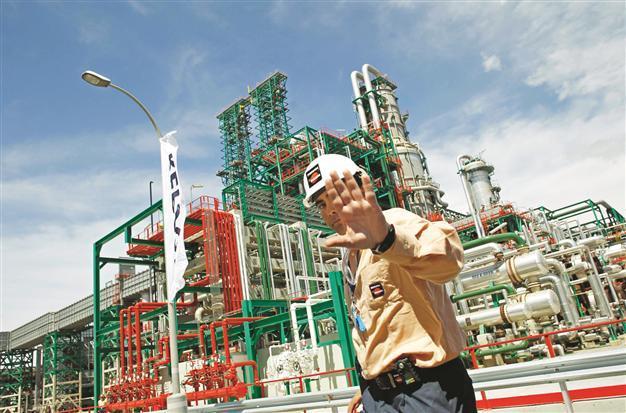Argentina speeds up Repsol seizure as international concerns grow
BUENOS AIRES - The Associated Press

A Repsol worker walks past the new extension of the Repsol oil refinery in Cartagena, southeastern Spain, on April 18. An incensed Spain threatened swift economic retaliation against Argentina last week after it seized control of YPF, the South American nation’s biggest oil company, in a move which pushed down shares in Spanish energy giant Repsol. REUTERS photo
The Argentinean government showed no signs of backing down on April 19 from expropriating a Spanish company’s controlling stake in its formerly state-owned energy company, shrugging off international condemnation while finding overwhelming support for the plan in congress.
Top officials also suggested that Argentina won’t pay anywhere near the $10.5 billion sought by Repsol-YPF for its stake, and that the company might not see any money at all before years of battles in international courts, if then.
Shares fall
Repsol shares have tumbled 17 percent this week, and Standard and Poor’s downgraded the company’s stock on April 19 to one step above junk. But YPF shares closed nearly 10 percent higher at $14.42 in New York trading the same day after losing half their value earlier in the week.
Argentina’s Senate is fast-tracking the expropriation measure, with only a handful of lawmakers opposed ahead of a floor vote on April 25. Some opposition members complained it seemed hastily prepared, but said they would vote for it anyway. Even Mauricio Macri, the Buenos Aires mayor who hopes to oust the government in 2015, said in a radio interview that he would keep YPF state-owned if elected, “now that the damage is done.” Sen. Anibel Fernandez said authors of the bill initially did not realize that YPF Gas, the nation’s largest natural gas distributor, was separate from Repsol-YPF’s Argentine oil operations, so its expropriation was added to the legislation at the last minute.
The Spanish company had no immediate reaction to the addition of the gas company to the expropriation legislation. “We are not commenting,” a Repsol spokesman, Kristian Rix, said in Madrid.
The impact on Latin America’s energy sector remains unknown. Other companies in the region also have stakes in Repsol, and vice versa.
Mexico’s state-owned Petroleos Mexicanos, for example, has nearly 10 percent of the company, while Repsol in turn owns sizeable stakes in other gas, fertilizer and chemical companies operating in Argentina.
The takeover prompted a flurry of meetings across Latin America as energy companies doing business in Argentina sought assurances. Executives of France’s Total Austral gas subsidiary met with Argentine Planning Minister Julio de Vido in YPF’s offices in Buenos Aires on April 19 and promised to increase its natural gas production at sites co-owned by YPF by 2 million cubic meters a day -enough to grow Argentina’s overall gas supply by 2 percent, de Vido announced.
